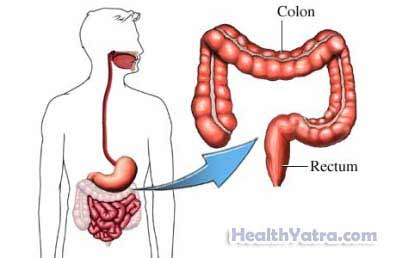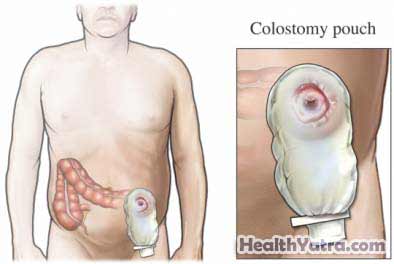সংজ্ঞা
This is an operation to remove all or part of the colon. The colon, or large intestine, is the lower part of the intestines.
In a partial colectomy, only part of your colon is removed. In a total colectomy, your entire colon is removed.

পদ্ধতির কারণ
A colectomy may be performed to treat a variety of conditions, including the following:
- Colorectal cancer
- Inflammatory intestinal diseases (eg, colitis, Crohn’s disease)
- Intestinal blockage
- Trauma to the intestine
- Diverticular disease —small pouches form in the wall of the colon
- Precancerous polyps, especially those seen in familial polyposis
- A hole in the bowel wall, or dead piece of bowel
- Bleeding from the colon
সম্ভাব্য জটিলতা
If you are planning to have a colectomy, your doctor will review a list of possible complications, which may include:
- Damage to other organs or structures
- সংক্রমণ
- রক্তপাত
- Hernia forming at the incision site
- রক্ত জমাট
- Complications from general anesthesia
জটিলতার ঝুঁকি বাড়াতে পারে এমন কারণগুলির মধ্যে রয়েছে:
- Having neurological, heart, or lung conditions
- Age: older than 70 years
- স্থূলতা
- ধূমপান
- Previous abdominal surgery
- Active infection
কি আশা করছ
পদ্ধতির আগে
আপনার ডাক্তার নিম্নলিখিত করতে পারেন:
- শারীরিক পরীক্ষা
- রক্ত পরীক্ষা
- Ultrasound exam of the abdomen—a test that uses sound waves to visualize the inside of the abdomen
- Barium X-ray —x-ray exam of the abdomen after swallowing a barium drink and/or receiving a barium enema
- Computed tomography (CT) Scan —a type of x-ray that uses a computer to make pictures of the inside of the body
- Magnetic resonance imaging (MRI) Scan —a test that uses magnetic waves to make pictures of the inside of the body
- Colonoscopy with biopsy samples—visual exam and removal of tissue inside the large intestine using a flexible tube with a camera on the end
আপনার পদ্ধতি পর্যন্ত নেতৃত্ব:
- Talk to your doctor about your current medicines. Certain medicines may need to be stopped before the procedure, such as:
- Aspirin or other anti-inflammatory drugs for up to one week before surgery
- Blood-thinning drugs such as warfarin (Coumadin)
- ক্লোপিডোগ্রেল (প্লাভিক্স)
- Drink at least eight, 8-ounce glasses of water daily.
- Follow a special diet, if recommended by your doctor.
- You will likely be given laxatives and other medicines to help clean out your bowels.
- Take antibiotics, if prescribed by your doctor.
- You may need to shower the night before your procedure, using antibacterial soap.
- Arrange to have someone drive you to and from the procedure and for help at home.
- The night before, eat a light meal or drink clear liquids as directed. Do not eat or drink anything after midnight unless told otherwise by your doctor.
- Wear comfortable clothing.
এনেস্থেশিয়া
You will receive general anesthesia for the surgery. You will be asleep.
পদ্ধতির বর্ণনা
The surgeon will make a single, long incision in the abdomen. She will remove the section of colon through the incision. When possible, the colon on either side of the removed section will be sewn together.
In a total colectomy, a colostomy or ileostomy will need to be formed. This will create a path for waste to leave your body. Your doctor will make a small opening, called a stoma, in the front of your abdominal wall. The open end of your intestine will be attached at the stoma. The stoma may be either temporary or permanent. This part of the procedure may also be done if your intestine needs time to heal and rest.

The surgeon will close the muscles and skin of the abdomen with stitches or staples. A sterile dressing will be placed over the incision areas.
অবিলম্বে প্রক্রিয়া পরে
The removed tissue will be sent to a lab for examination. You will be taken to the recovery room and monitored.
How Long Will It Take
About 1- 4 hours or more
এটা কতটা আঘাত করবে?
Anesthesia is given to prevent pain during the surgery. Pain is common during recovery. You will receive medicine to help manage pain.
গড় হাসপাতালে থাকার
This procedure is done in a hospital setting. The usual length of stay is 5-6 days. Your doctor may choose to keep you longer, however, if complications arise.
পোস্ট-প্রক্রিয়া যত্ন
হাসপাতালে
- If you had a colostomy or ileostomy, a pouch will be attached on the outside of your body. Waste material will be collected in it. You will receive instructions about diet and activity. During the first few days after surgery, you may be restricted from eating.
- You will wear boots or special socks to help prevent blood clots.
- You will be encouraged to practice deep breathing to help open your lungs.
ঘরে
আপনার পদ্ধতির পরে, আপনার ডাক্তারের নির্দেশাবলী অনুসরণ করতে ভুলবেন না।
If you have a colostomy:
- You will need to take it easy for 1-2 months.
- A specialized nurse will teach you how to care for the stoma site and change the ostomy bag .
- You will progress from a clear liquid, to a bland, low-fiber diet, to your regular diet after about 6-8 weeks.
- Alert your physicians and pharmacist that you cannot take medicines that are considered time-released or time-sustained.
- Do not use laxatives, because postcolostomy stools are usually quite liquid.
- Drink eight, 8-ounce glasses of liquid daily as extra fluids will be lost in your stool.
- কখন গোসল করা, গোসল করা বা জলে ভিজানো নিরাপদ সে সম্পর্কে আপনার ডাক্তারকে জিজ্ঞাসা করুন।
- আপনার ডাক্তারের নির্দেশাবলী অনুসরণ করতে ভুলবেন না।
আপনার ডাক্তারকে কল করুন
আপনি হাসপাতাল ছেড়ে যাওয়ার পরে, নিম্নলিখিতগুলির মধ্যে যেকোনটি ঘটলে আপনার ডাক্তারের সাথে যোগাযোগ করুন:
- জ্বর এবং ঠাণ্ডা সহ সংক্রমণের লক্ষণ
- লালভাব, ফোলাভাব, ক্রমবর্ধমান ব্যথা, অত্যধিক রক্তপাত, বা ছেদ স্থান থেকে কোনো স্রাব
- বমি বমি ভাব এবং/অথবা বমি যা আপনি অস্ত্রোপচারের পরে দেওয়া ওষুধ দিয়ে নিয়ন্ত্রণ করতে পারবেন না, বা যা হাসপাতাল থেকে ছাড়ার পরে দুই দিনের বেশি সময় ধরে থাকে
- ব্যথা যা আপনি ওষুধ দিয়ে নিয়ন্ত্রণ করতে পারবেন না
- ব্যথা, জ্বালা, জরুরী বা প্রস্রাবের ফ্রিকোয়েন্সি, বা প্রস্রাবে অবিরাম রক্তপাত
- কাশি, শ্বাসকষ্ট বা বুকে ব্যথা
- জয়েন্টে ব্যথা, ক্লান্তি, শক্ত হওয়া, ফুসকুড়ি বা অন্যান্য নতুন উপসর্গ
- Feeling weak or dizzy
- আপনার পা, বাছুর বা পায়ে ব্যথা বা ফোলা
- Bloody or black stools
- ডায়রিয়া
- Lack of stool in the colostomy bag
- সাংঘাতিক পেটে ব্যথা
- Bleeding from the stoma
- Not collecting stool in the ostomy pouch
জরুরী পরিস্থিতিতে, অবিলম্বে চিকিৎসা সহায়তার জন্য কল করুন।
